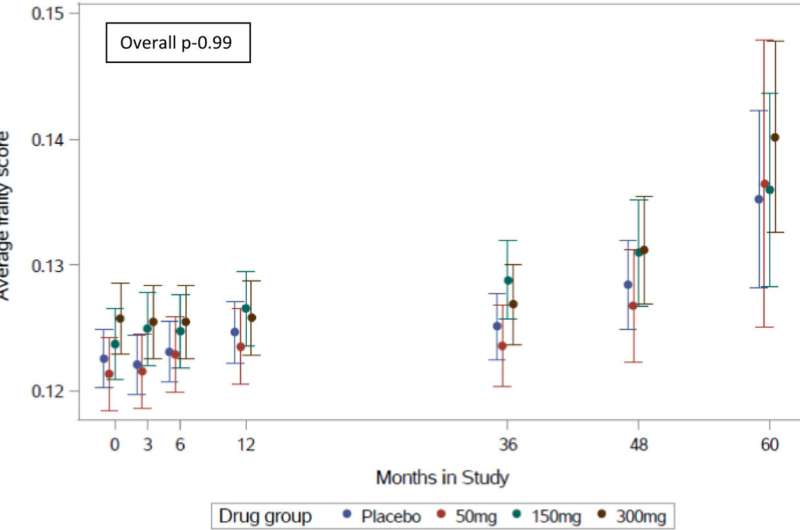This article has been reviewed according to Science X's editorial process and policies. Editors have highlighted the following attributes while ensuring the content's credibility:
fact-checked
peer-reviewed publication
trusted source
proofread
Study finds no effect of anti-inflammatory medication on incident frailty

Frailty is a common condition in older populations that increases the risk of adverse health outcomes and mortality. Inflammation, associated with other aging-related conditions, has been proposed as one possible underlying mechanism for frailty. It was previously unclear if anti-inflammatory medications like canakinumab can also reduce the risk of frailty.
Researchers led by a team at Brigham and Women's Hospital, a founding member of the Mass General Brigham health care system, tested if canakinumab affected frailty incidence in adults with atherosclerosis.
The investigators performed post-hoc analysis on a dataset from the Canakinumab Anti-Inflammatory Thrombosis Outcomes Study (CANTOS) to examine the effects of the medication on frailty, self-reported functional ability, and cardiovascular events. The multinational, double-blind trial involved almost 10,000 stable post-myocardial infarction patients who were randomly allocated to receive either canakinumab or placebo every three months from 2011–2017.
During the trial, 1,080 patients became frail over a period of five years. The post-hoc analysis by the researchers did not find an effect of random allocation of canakinumab on frailty incidence or self-reported function. In addition, frailty status did not affect the relative efficacy of canakinumab for preventing cardiovascular events.
The study was limited to patients with atherosclerosis and did not include those without cardiovascular diseases. The authors suggest that it is possible that frailty in these participants could develop independent of canakinumab-affected pathways.
"It's still unclear whether inflammation is a bystander or a causal factor in the development of frailty," said corresponding author Ariela Orkaby, MD, MPH, of the Division of Aging. "More randomized trials with anti-inflammatory medications will help understand their role in preventing frailty and functional decline in older adults."
The study is published in the journal Aging Cell.
More information: Ariela R. Orkaby et al, Effect of canakinumab on frailty: A post hoc analysis of the CANTOS trial, Aging Cell (2023). DOI: 10.1111/acel.14029


















